 Iran’s Attack on Israel
Iran’s Attack on Israel
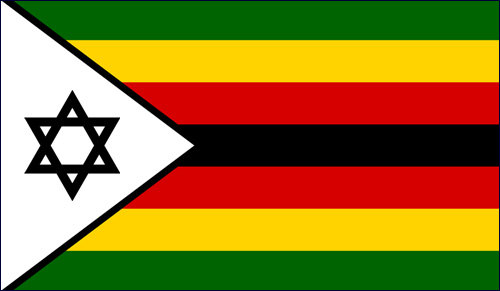
Jewish Geography

Jewish Geography
7 min read
Unknown to many, Zimbabwe is home to a small Jewish community.
On November 15, 2017, military authorities placed Zimbabwe’s long-time dictator, President Robert Mugabe, under house arrest. His wife, Grace Mugabe, is challenging former Vice President Emmerson Mnangagwa for leadership. Both would-be new presidents have fearsome reputations and widespread demonstrations have been planned throughout the country.
Unknown to many observers, Zimbabwe is home to a Jewish community. Here are seven little-known facts about Jews and Zimbabwe.
In the late 1800s, the British South African Company, led by Cecil Rhodes, carved out an enormous area of influence in southern Africa. Named “Rhodesia”, it encompassed what today are the nations of Zambia in the north and Zimbabwe in the south.
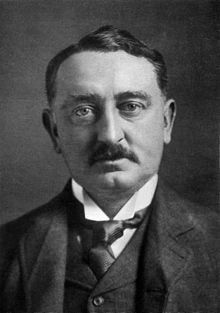 Cecil Rhodes
Cecil Rhodes
Jews, like other European settlers, began to pour into southern Africa in the late 1800s. According to historian Hugh MacMillan, these Jews “were both economic migrants and refugees, escaping from the kind of religious and political persecution in the Russian Empire, and also economic migrants looking for a place where they could make a better living.” Most of these immigrants went to South Africa, but some more adventurous settlers ventured further north, into Rhodesia, where many worked as cattle traders.
“No history of Rhodesia should fail to mention the remarkable generosity of Sir Alfred Beit, (Cecil) Rhodes’ silent and self-effacing partner,” observes historian Robert Blake in his landmark work A History of Rhodesia.
Although Rhodesia was named after the famous British businessman and politician Cecil Rhodes, Rhodes’ success was enabled by Alfred Beit, a Jewish immigrant from Germany. Beit was one of the first Europeans to see business potential in southern Africa.
Beit was born into a poor Jewish family in Germany in 1853. He started his working life with a firm that imported wool and diamonds, and soon worked in the diamond industry in Holland. In 1875, Beit was sent to South Africa to help set up a diamond mine. He realized that African diamonds were of a much higher quality than any diamonds currently for sale in Europe and he started developing diamond mines and championing new mining techniques.
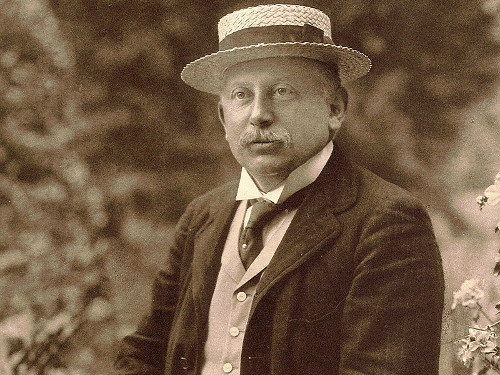 Alfred Beit, 1905
Alfred Beit, 1905
A few years later, Beit met Cecil Rhodes, another diamond industry manager. Beit later recalled that Rhodes asked him if he ever took a rest; “not often” Beit replied. Rhodes explained his idea of launching a consolidated mining company to develop the region’s mines, and Beit advanced him the 250,000 pounds he needed for the venture - with no security down. Beit’s gamble paid off, and the British South African Corporation received its Royal Charter in 1889, with Beit helping to run the massive venture.
Beit was responsible for much of Southern Africa’s diamond industry’s development, but his great passion was endowing railroads and other infrastructure that developed the region. He endowed the Beit Trust before his death in 1906, and this fund still exists, giving grants to buildings and transportation infrastructure that continues to transform and improve the region today. http://www.beittrust.org.uk/
The first synagogue in what is today Zimbabwe was set up in a tent in what then was the remote town of Bulawayo. In 1894, twenty Jews came together to establish a place of worship in their new home.
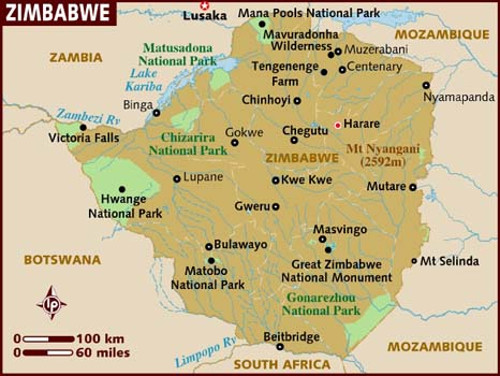
The following year, a synagogue was established in Harare (then called Salisbury), and a third synagogue was established in Gwelo in 1901. The smaller cities of Kadoma and Kwekwe were also home to Jewish communities. In 1898, Bulawayo’s Jews set up a chapter of the Zionist organization Chovevei Zion to help express their yearning for and aid to a future Jewish state. By 1900, about 400 Jews lived in what was formerly called Southern Rhodesia and today is known as the independent nation of Zimbabwe.
The Greek island of Rhodes (which, despite its name, has no connection with Rhodesia), was home to a rich, 3,000 year old Jewish community. Many Jews of Rhodes spoke Ladino and could trace their family’s histories to the Jewish expulsion from Spain in 1492.
In 1911, Rhodes came under Italian rule; the Jewish population at the time numbered about 4,000. As fascism gained adherents, and particularly after Mussolini rose to power in 1938, most of Rhodes’ Jews fled. In a coincidental overlap of place-names, hundreds of these Jews fled to the southern African territory of Rhodesia, today known as Zimbabwe. In 1931, these refugees established the Sephardi Hebrew Congregation in Harare, Zimbabwe’s capital.
Sephardi Jewish immigrants also founded two of the most well-known shopping malls in Harare: Sam Levy’s Village and Avondale Shopping Center. Sephardi Jews also set up textile mills and factories in their new home, providing thousands of jobs in the region.
Zimbabwe’s Jewish population peaked during the boom years following the Second World War. In 1961, the region was home to over 7,000 Jews. Years of political instability saw that number decrease sharply.
In 1964, Zambia (formerly known as Northern Rhodesia) declared independence. Southern Rhodesia remained a British colony until 1965: that year the white supremacist leader Ian Smith declared independence for his Rhodesian Front government. A decade of bitter civil war ensued, during which most of the country’s Jewish population fled to neighboring South Africa. In 1980, the nation became the Republic of Zimbabwe, with Robert Mugabe as leader.
Mugabe’s Zimbabwe originally was home to over a thousand Jews, but years of poor economic policy saw more and more Jewish Zimbabweans flee the country. As Mugabe’s long rule continued, the leader became increasingly irrational, lashing out at minorities, including Jews, whom he accused of undermining the country.
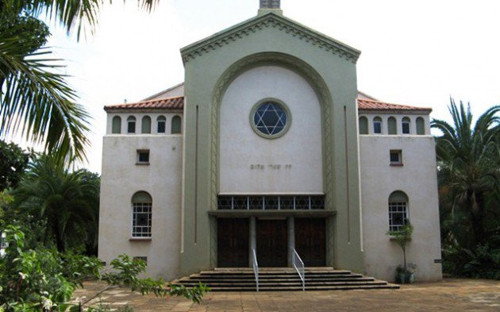 Synagogue in Harare
Synagogue in Harare
Today, about 120-130 Jews live in Zimbabwe, primarily in Harare and Bulawayo. Two thirds of the community is aged 65 or older. Harare is home to two synagogues, one Ashkenazi and one Sephardi, but since the early 2000s, they have held joint services in order to ensure they can get a minyan. In 2003, Bulawayo’s only surviving synagogue burned to the ground, though a new building has been erected. A shochet, or kosher slaughterer, visits Zimbabwe twice a year from South Africa. Despite the small size of the community, there are still two Jewish schools in Zimbabwe: one in Bulawayo and one in Harare.
The Lemba are a southern African group that lives in Zimbabwe and South Africa, and has long noted some similarities between their traditions and Jewish practices. Lemba people do not eat pork, they observe a weekly holiday, and they even have a custom of carving stars that look like the Jewish symbol the Star of David on their tombstones. They also speak a sacred language that has elements of Hebrew and Arabic, and likely was imported to Africa hundreds of years ago from ancestors in Yemen.
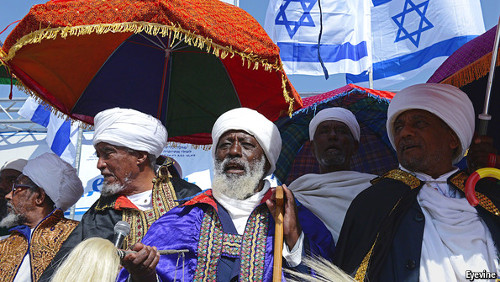 Lemba tribe members
Lemba tribe members
Lemba people have long believed they are descended in part from Jewish visitors to Africa, and recent genetic testing seems to support the claim that many Lemba tribesmen have some Jewish origins. Most Lemba are Christian, though some are Muslim. Although the group used to be very close-knit and closed to outsiders, in recent years younger Lemba people seem to be more willing to marry non-Lembas and assimilate into wider southern African culture.
As the political turmoil in Zimbabwe continues, the country’s tiny Jewish community is determined to carry on as usual. Harare’s Jewish school did close briefly after Pres. Mugabe was arrested, but then reopened as usual. “At this stage, Shabbat services will go ahead,” explained Rabbi Moshe Silberhaft, of the African Jewish Congress.
One local resident told The Jerusalem Post in the days after the change of government that Zimbabwe’s Jews are hoping for better times to come, and in the face of current turmoil, they remain “cautiously optimistic.”
